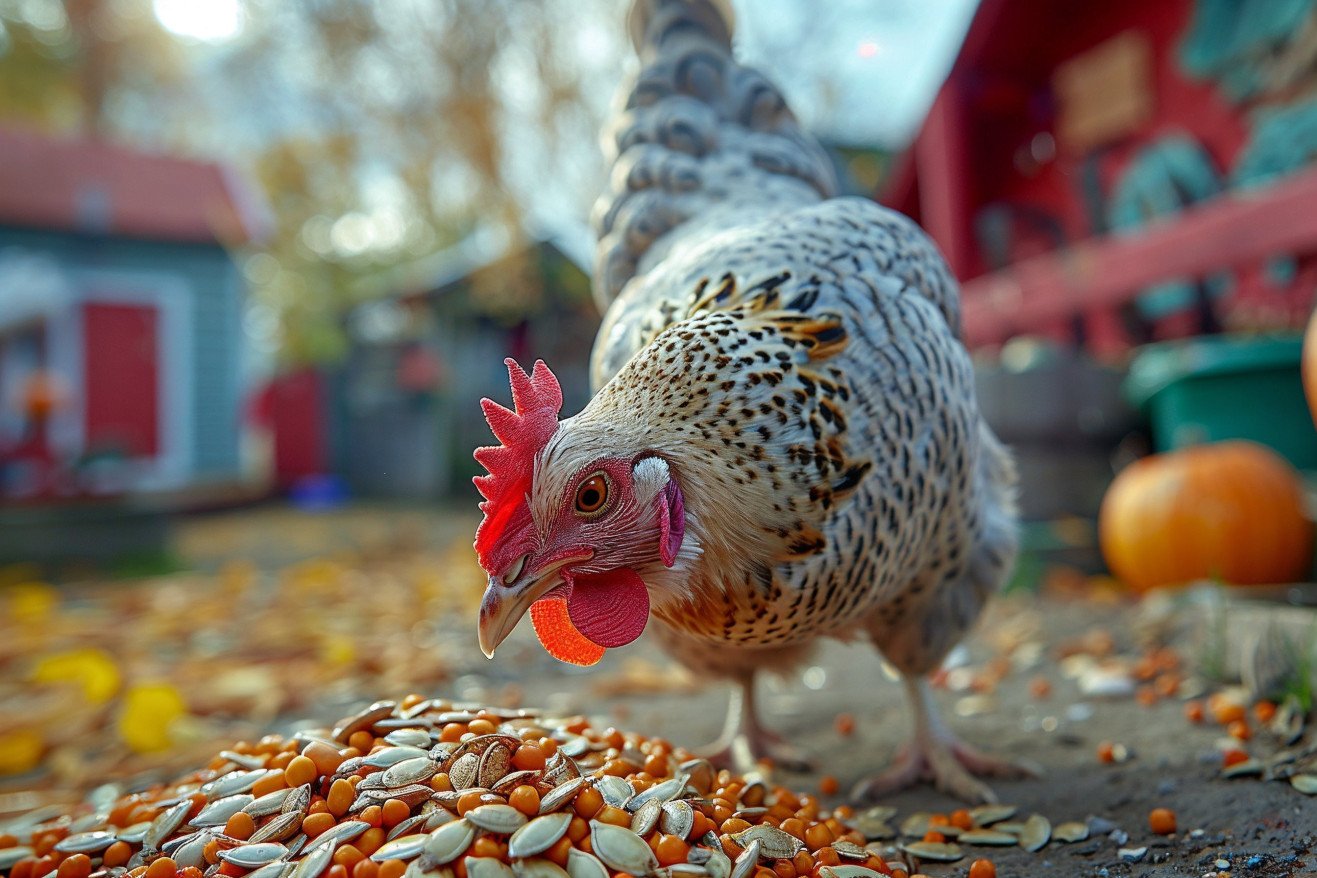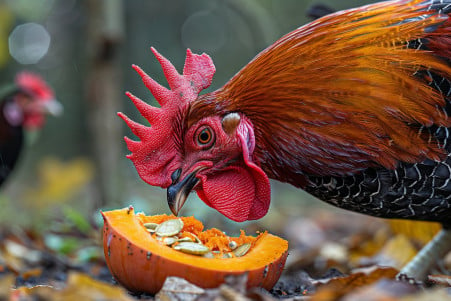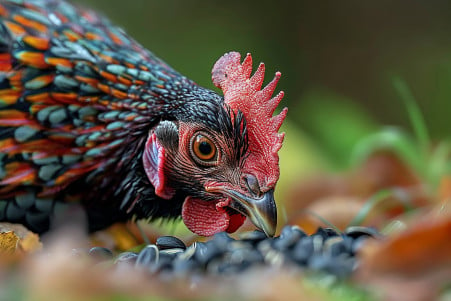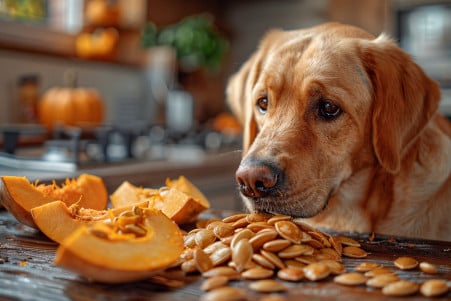Can You Feed Pumpkin Seeds to Chickens? Pros and Cons
16 April 2024 • Updated 16 April 2024

Pumpkin seeds are a healthy treat that chickens will enjoy, but there are some things to know before adding them to your chickens' diet. While pumpkin seeds are a great source of protein, vitamins, minerals, and healthy fats for chickens, they are also high in fat and calories, so they should be given to chickens in moderation.
In this evidence-based article, we'll take a deep dive into the nutritional benefits of feeding pumpkin seeds to chickens. We'll cover everything from how much to feed them to how to prepare the seeds and how to feed them to your chickens safely. We'll also discuss any potential health risks or other cons to feeding pumpkin seeds to chickens.
Can chickens eat pumpkin seeds?
Serving Sizes and Diet Recommendations
Pumpkin seeds should be used as a treat for chickens, not as a substitute for their regular feed. Overfeeding pumpkin seeds, as Hobby Farms points out, can lead to an imbalance in your flock's diet and a lack of essential nutrients. So, it's important to use these high-fat, high-fiber treats in moderation.
The recommended serving size is approximately 1-2 tablespoons of pumpkin seeds per chicken per day. Consuming more than this can lead to digestive problems due to the seeds' high fiber and fat content. As a result, it's best to start by feeding your chickens small amounts of pumpkin seeds and then increase the amount based on how they respond. If you notice that your chickens are experiencing loose droppings or other digestive problems, you should reduce the amount of pumpkin seeds you're feeding them.
While pumpkin seeds can be a great way to give your chickens a nutritional boost, it's important to remember that they are a treat and shouldn't be used to replace a chicken's regular feed. However, if you make sure to feed your chickens treats in moderation and make sure they're getting a well-balanced diet, you can make sure your chickens can enjoy the benefits of pumpkin seeds without any risks. This leads us into the next section, which covers the benefits and drawbacks of different ways of preparing pumpkin seeds.
How Should You Feed Them: Raw, Roasted, or Hulled?
Chickens can eat pumpkin seeds in a variety of ways, from raw and hulled to roasted and unhulled. According to BackYard Chickens, feeding chickens whole, raw pumpkin seeds is the most natural and easiest way to give them this nutritious snack.
If you want to mix things up, The Good Life Backyard recommends lightly roasting the pumpkin seeds before giving them to your chickens. However, make sure you don’t give them heavily seasoned or salted seeds, which can be toxic to chickens.
Some chicken owners hull the seeds before feeding them to their chickens, as Ready Nutrition says this can make them easier for chickens to eat. However, leaving the seeds unhulled can encourage natural foraging. The most important thing is to try different options to see what your chickens like best, while making sure you don’t overfeed them.
Deworming Properties: Fact or Fiction?
The evidence is mixed on whether pumpkin seeds have deworming properties for chickens. Some studies have shown that the amino acid cucurbitin in pumpkin seeds can paralyze and expel worms. As The Chicken Chick notes, this strange amino acid found in some Cucurbita plants is thought to kill worms in the intestines, allowing the body to expel them.
On the other hand, other studies have shown that direct feeding of pumpkin seeds is not an effective dewormer. According to Backyard Poultry, "Feeding pumpkin seeds for chickens is not an effective dewormer." The article explains that to make pumpkin seeds an effective dewormer, an alcohol-based tincture may need to be created to extract the active compounds.
Although pumpkin seeds may have some deworming properties, Dine a Chook advises that regular deworming with products recommended by a veterinarian is the best way to ensure a healthy flock. The evidence on the effectiveness of using pumpkin seeds alone as a dewormer is still up in the air. While feeding chickens pumpkin seeds as part of a well-rounded diet can offer some health benefits, it's not a substitute for proven deworming treatments.
When Are Pumpkins in Season and How Can You Store Them?
Pumpkins are a seasonal crop, so they are typically available in the fall and early winter. However, if you want to make sure you can feed pumpkin seeds to your chickens throughout the year, you'll need to know how to store them. According to The Self Sufficient HomeAcre, you can often find pumpkins for free (or nearly free) after Halloween, or you can grow your own pumpkins and winter squash to make sure you have a source of winter nutrition for your flock.
To store pumpkins, you'll want to make sure you get them fresh from the vine. The Self Sufficient HomeAcre says you should cure them in the sun for about two weeks and then clean the outside of the pumpkin, removing any dirt or debris, and apply a light coating of oil. This oil will create a barrier that will help keep out moisture and pathogens, allowing the pumpkins to be stored on a shelf in a cool, dark location for several months.
If you want to make sure you have access to pumpkins year-round, Backyard Poultry says you can mix the pumpkin guts, including the seeds and pulp, into a grain mixture that can be frozen and then fed to chickens over the course of the year. You can also use frozen or canned pumpkin puree as a treat when fresh pumpkins aren't available. By using these storage methods, you can make sure your chickens can benefit from pumpkins all year long.
Conclusion: Pumpkin Seeds are a Healthy, Nutritious Snack for Chickens
Chickens can eat an entire pumpkin, from the flesh to the 'guts' and seeds. As Mother Earth News explains, pumpkins are a rich source of vitamins A, B, and C, as well as zinc and potassium - all of which are important nutrients that chickens may not be getting enough of.
The seeds themselves are also nutritious and contain vitamin E, zinc, and other beneficial compounds. Backyard Poultry says that the whole pumpkin, including the stringy insides, seeds, and skin, can be fed to chickens. However, keeping the seeds intact will allow the chickens to forage for them.
Meanwhile, Raising Happy Chickens says that pumpkin seeds are a rich source of vitamin E, zinc, and potassium - all of which are important for a chicken's immune system, bone health, and overall well-being. This means that pumpkin seeds can be a valuable addition to a chicken's diet when they are fed to the chickens in moderation.
When fed in moderation, pumpkin seeds can be a healthy, nutritious snack for chickens. They are a good source of essential vitamins, minerals, and healthy fats that can help support a chicken's overall health. It's important to control portions and prepare the seeds properly to avoid digestive upset or nutrient imbalances.
While pumpkin seeds may have some deworming properties, it's still best to use veterinary products for regular deworming. With the right storage, pumpkin seeds can be a seasonal treat that chickens can enjoy throughout the year.


